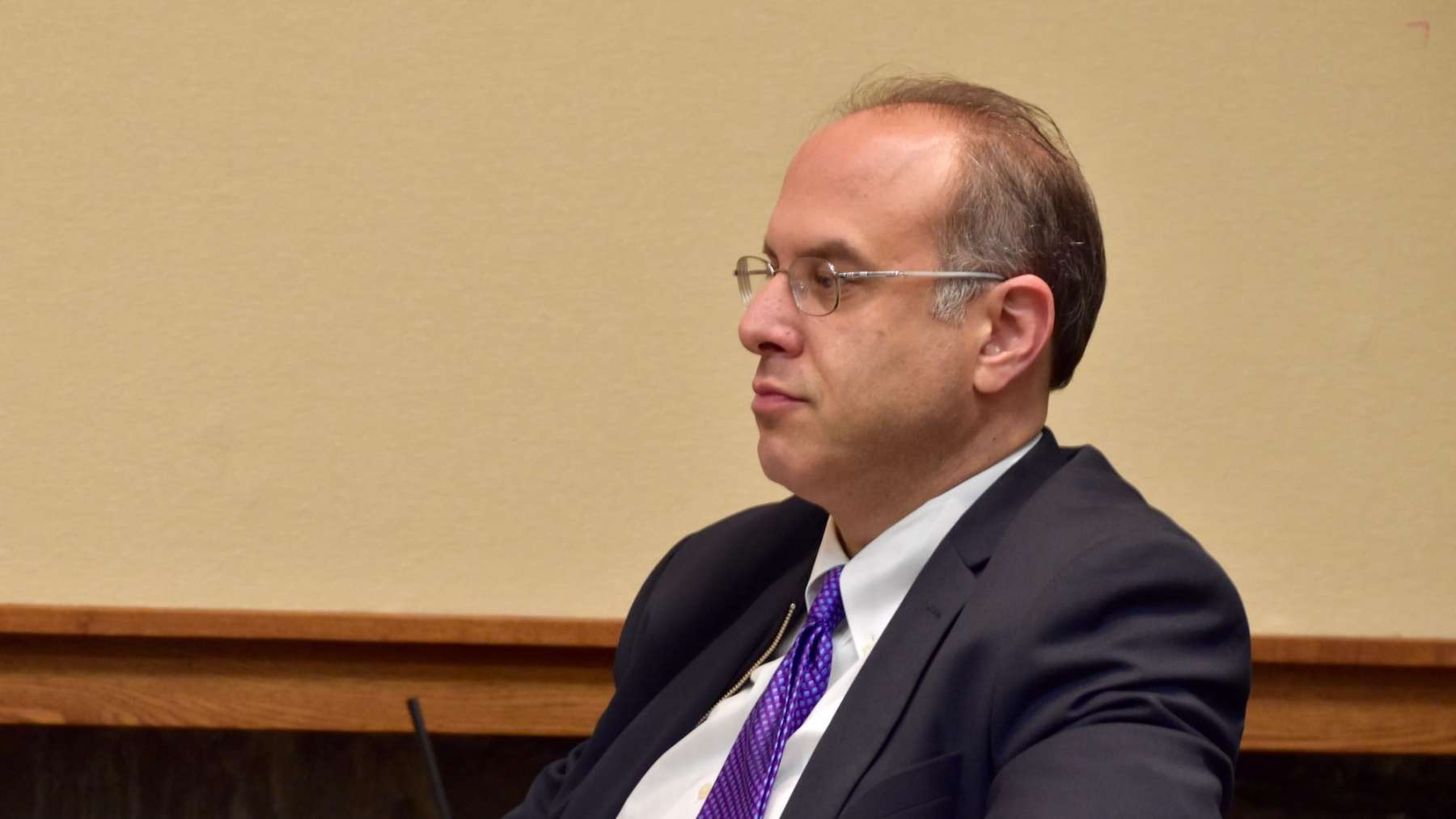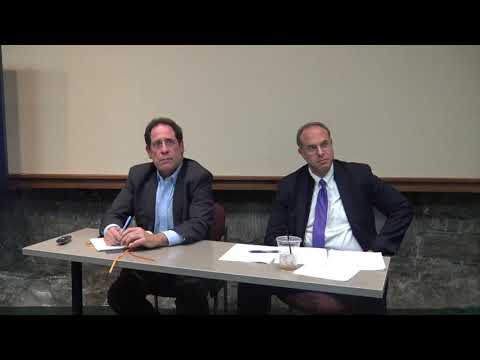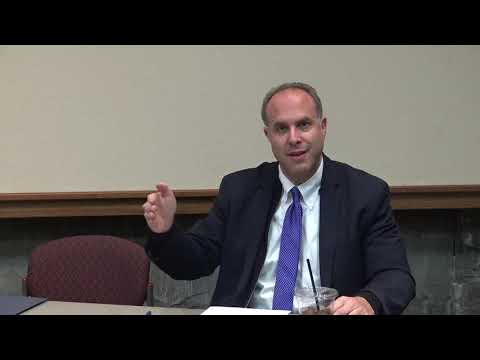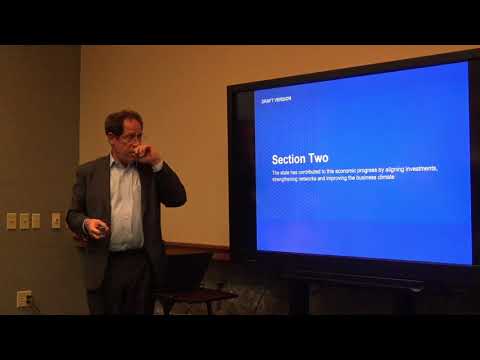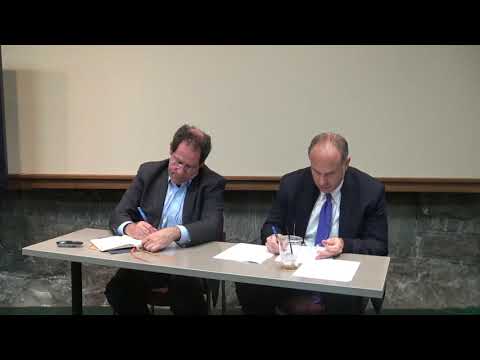Rhode Island Economic Development Strategy comes under fire for being paid for by corporate lobbyists
“When people are paying your salary it affects the decisions that you make around policy,” said Senator Sam Bell. “And I think that the ethics principles that guide not taking money from corporate interests – and the Chambers of Commerce and the Partnership for Rhode Island are the most powerful corporate lobbying groups in this state – is really important,
November 13, 2019, 11:31 am
By Steve Ahlquist
“When people are paying your salary it affects the decisions that you make around policy,” said Senator Sam Bell. “And I think that the ethics principles that guide not taking money from corporate interests – and the Chambers of Commerce and the Partnership for Rhode Island are the most powerful corporate lobbying groups in this state – is really important, because this economic plan matters.“
Bruce Katz presented a draft of his update to Rhode Island’s Economic Development Strategy at the Providence Chamber of Commerce on Monday, as part of a public meeting of Rhode Island’s Economic Development Planning Council, headed up by Commerce Secretary Stefan Pryor.
Katz was chosen by the state to update the plan, and in truth there were few surprises. Katz is being paid $750k for his work via a variety of sources that include the Rhode Island Commerce Corporation, the state Department of Labor and Training, and private sources including the Providence Chamber of Commerce and the Partnership for Rhode Island. You can watch Katz’s presentation below, and see his slides as well.

It was during the Q&A at the end of the presentation that things got very interesting.
Rhode Island State Senator Senator Samuel Bell (Democrat, District 5, Providence), the only elected official in the room, asked if Katz could put the slide from his presentation that dealt with Rhode Island’s unemployment rates back onto the screen.

“I have to start and talk about what I think is an uncomfortable topic for a lot of people in this room, but it’s about ethics,” said Bell.
“About what?” asked Katz.
“Ethics,” said Bell. “It was reported by the Boston Globe, about a month ago, that this particular contract, to develop our economic development plan, was receiving private funding. As a State Senator, if I took hundreds of thousands of dollars in private money, especially from interested parties, to develop policy, it would be illegal.”
[See also the Providence Journal, here.]“Now, because policy making has been privatized here, the code of ethics does not apply,” continued Bell, “But I submit that the same principle does.
“One of the things reported [is] that there’s a New York foundation that pushes certain corporate policies, that it committed $100,000. But it was also reported that there were conversations with the Partnership for Rhode Island, and both the Newport and Providence Chambers of Commerce to commit funding that would ultimately go to pay New Localism Advisors and Bruce Katz personally.
“When people are paying your salary it affects the decisions that you make around policy. And I think that the ethics principles that guide not taking money from corporate interests – and the Chambers of Commerce and the Partnership for Rhode Island are the most powerful corporate lobbying groups in this state – is really important, because this economic plan matters.
“The economic policies we put in place matter and corporate interests have an interest.”

“The reason I wanted to go back to that slide is you can see the results,” said Bell. “Because before we implemented these corporate policies our unemployment rate was plummeting, relative to the national average. And once we implemented these policies, once they start to bite – implemented largely at the beginning of 2015, we see it stall. And that means people in my district suffering because of the economic damage.
“All throughout this conversation we’ve focused on one subject. We focused all on microeconomics. The economy is not driven by one particular business deal or one particular regulation. That’s what business leaders, a lot of people in this room, see. The economy is driven by the real economy. It’s driven by stimulus. It’s driven by aggregate demand. Ad the decision that was made that hurt this economy most was to pay for those tax cuts, to pay for those incentives [by] eviscerat[ing] Medicaid.
“We lost tons of Federal money, and that is where the multipliers are biggest. When every robust academic study does it and looks at where the multipliers are largest, it’s on programs like Medicaid. And when we slashed those funds, we eviscerated our economy. And it hurt business too.
“The nursing home in my district that shut down, is a business. The hospitals that are getting bought out by out of state corporations, that are laying off staff, that are experiencing massive labor strikes, and in one case shutting down, those are businesses too and the hospitals that are going to shut down are going to cost thousands and thousands of jobs if we don’t do something about this.
“Investments in Medicaid are crucial. When we cut the, when we eviscerate the aggregate demand in our economy, the effects ripple, and we see things like that,” said Bell, pointing to the unemployment slide.
“So, I am hoping, couple of things,” continued Bell. “One, I’m hoping the Chambers of Commerce…”
“Please complete your comments with your final set of comments if you would,” interrupted Pryor. “You’re at the end of your two minutes.”
“Yes,” said Bell. “I’m hoping the Chambers of Commerce will have the integrity to not put up cash, to not exploit this privatization loophole in the code of ethics, and the same with the Partnership for Rhode Island. And I hope that if they do [put up cash then Bruce Katz] will have the integrity to return it.
“And finally, I hope that if we start thinking about this, instead of thinking about corporate policy – instead of thinking about corporatist changes to microeconomic policy – we do something about aggregate demand and we do something about macroeconomics so that we can actually grow our economy and so that the graph doesn’t look like that, So the line goes back and starts rising, relative to this country as a whole, instead of stagnating from rapid growth.”
“Look,” said Katz. “I’ve been working in this field for 30-35 years, and I do my work independently, objectively – So I am offended if you think that any investment in work I do has any effect on my ultimate conclusions and findings.
“If you want to have a conversation about what drives economic growth, from the [garbled] perspective, from the sustainable perspective, the innovative perspective, I’m happy to have that conversation. But I’ve been working in this field for 35 years, and I will stand by everything that I’ve done. So do not make an accusation like that without any evidence whatsoever.”
“Do you deny that $100,000…” asked Bell.
“This is not a back and forth,” interrupted Pryor. [crosstalk] “Thank you Senator. Appreciate it very much.”
Here’s the video of Katz and Pryor listening Bell:
Contrary to Katz’s assertion, there is plenty of evidence that economists can be influenced by who is paying them. See: Preventing Economists’ Capture by Luigi Zingales, for instance.
Bell released a statement after the hearing:
“Bruce Katz’s argument was the same one that Donald Trump famously advanced in the Ukraine scandal – that there’s no quid pro quo. Katz didn’t deny taking the money. He argued that it’s okay that he’s taking money from interested parties as long as there’s no explicit agreement that he will enact their policies. With Bruce Katz, we know that the Chamber of Commerce and the other corporate groups have policy goals they want in the state economic plan, and we know they’re paying him hundreds of thousands of dollars. With Trump, we knew that he wanted an investigation into the Bidens, and we knew he withheld cash when it wasn’t happening. When there’s big money on the table, and the policy goals are clear, it doesn’t matter if there’s an explicit agreement. When the money flows, everyone knows.“
Here’s the introduction to Bruce Katz’s report, from Laurie White of the Providence Chamber of Commerce and State Secretary of Commerce Stefan Pryor:
Here’s Katz’s presentation:
Here’s the entirety of the Q&A:
Here are the slides (minus one) from the presenation:
UpriseRI is entirely supported by donations and advertising. Every little bit helps:
Become a Patron!



